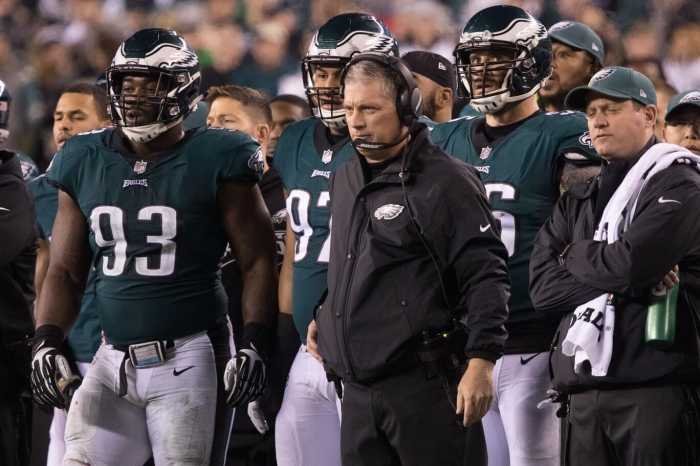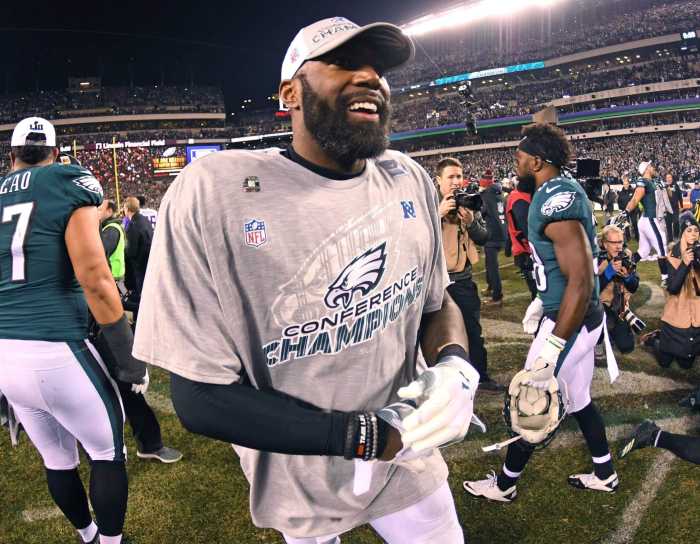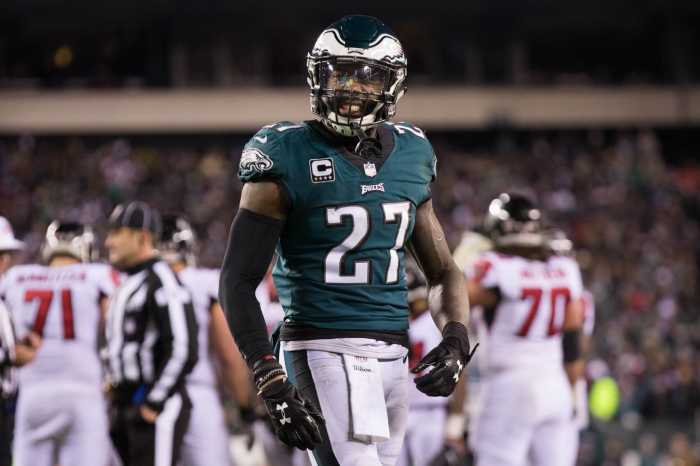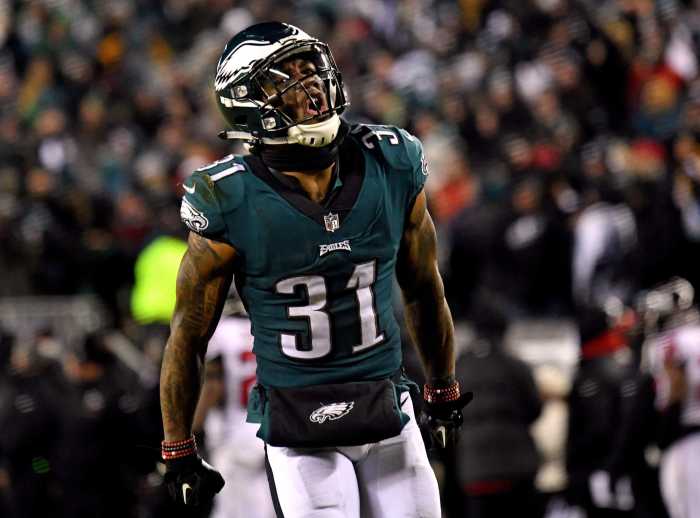The Philadelphia Eagles are facing a changing of the guard. The team announced they would be moving on from their starting safety. Malcolm Jenkins, after failing to pick up the 32-year-old’s club option on his contract.
Long story short, Philadelphia brought back defensive back Jalen Mills with a focus on transitioning the former cornerback to safety, with the hopes of replacing Jenkins’ role on defense.
Having made these decisions has put the Eagles’ fanbase, for the most part, in a complete state of shock. Jenkins has been a vital part of the organization since coming over from the New Orleans Saints during the 2014 offseason. Now that Jenkins has officially rejoined New Orleans, the Eagles look to turn the page from one of their franchise cornerstone figures and see what they have in Jalen Mills at a position many would argue fits his skill set tremendously.
Playing safety isn’t entirely a new concept for Mills. During Mills’ final two seasons at LSU, the defensive back saw most of his snaps at safety while also seeing snaps in the slot and cornerback throughout his tenure. Entering the 2016 NFL Draft, the perception was for Mills to continue his play at safety, but that hasn’t been the case so far in Philadelphia as the defensive back has struggled to solidify himself as an outside cornerback.
Fast forward to the 2020 offseason, and Mills is transitioning back to safety after agreeing to the move, one he has been reluctant to in the past, signing a one-year, prove-it deal with the Eagles.
After having some time to sit and digest this move for Philadelphia, there are factors to this transition that provide optimism. Expecting Mills to become as good of a player as Jenkins was for the Eagles is a tall task. Hell, the organization may not even expect such a thing. This move signals the value they put on Jenkins’ role moving forward on defense and opted not to increase his salary demands given the circumstance they were able to replace the veteran with a younger Mills in that role for a lower rate.
The Eagles were not serious about bringing Jenkins back, and if they were, the team could’ve. According to Jeff McLane, Jenkins wanted an extension on his current deal that expired in 2021. The Eagles were willing to tweak his current deal but refused to extend his current contract. Many are left wondering why the team let a vital component of the defense go, while others point to this transaction as a rebuilding move. The truth is, the Eagles are confident enough in either Mills finding his niche and finally solidifying his position for the long-term with Philadelphia, or discovering another cost-efficient, and young player to build around.
Jenkins spent the majority of his 1,015 defensive snaps (first to third down) in the box this in 2019 (399 snaps). Since 2017, the Eagles have valued his play more in this specific role for the defense, while still using his versatility to their advantage. Mills has also followed this exact path but has regularly been Philadelphia’s left cornerback majority of his career, a spot he’s struggled to maintain. Still, the soon-to-be 26-year-old defensive back has lined up in the box (190 snaps since 2016 according to PFF) and around the line of scrimmage where his physical traits displayed.
Injuries during the last two seasons have forced Mills to miss a total of 15 games, but taking a look at his production against the run during his last full season as a starter in 2017 prove there’s a bonus to his new role. The defensive back produced 23 run-stops that season while primarily being an outside cornerback. That may not be on the same level as Jenkins run-stuffing statistics, but given the difference in positions, and Jenkins being on the field for more snaps, there’s reason to be optimistic Mills can provide the same production with this new role
Jenkins himself benefitted a transition from cornerback to safety during his first stop with the Saints. The defensive back’s outside coverage was becoming the Achilles heel of New Orleans defense, and the team opted to shift the former first-round pick to safety, a career-altering move for Jenkins. This same method is now what Philadelphia has in place for Mills.
Size has come up as an issue for Mills replacing Jenkins, but to clarify on that theory — the two players are nearly identical in size. Both are the same height, while Jenkins has a slight edge in weight by about 13 pounds. Surely Mills was given the proposition to add weight while accepting this new role, but it won’t take much to match Jenkins’ frame.
Focusing on where Mills makes the majority of his impact on defense is when you watch the defensive back lurk around the line of scrimmage and within the sticks.
The physicality Mills possesses comes across as menacing at the line of scrimmage and appears to be a huge indicator of why the Eagles view him as an adequate replacement for Jenkins in the box safety role.
Mills’ range, transitional footwork, and closing speed are three aspects of the defensive back’s game that can be nothing but benefactors in the transition to safety for the defensive back. Look how quickly Mills closes in on forcing this run stop immediately after Tom Brady hands the ball off.
When Mills is playing underneath and not beyond the sticks, he’s a productive player. When you ask him to be on an island covering a wide receiver beyond the sticks, that’s where Mills struggles the most. Now with the transition to hybrid safety, Mills won’t be assigned a lot of deep coverage anymore, which gives the Eagles possibly more production out of the versatile defensive back.
Marquand Manuel enters his first season as Eagles defensive backs coach. Philadelphia is tasking him with the handling of Mills’ transition of cornerback to safety, a shift the coach has been familiar with at his previous stop with the Atlanta Falcons.
Manuel handled Damontae Kazee and Richardo Allen’s transition with success, converting both from cornerbacks into starting safeties for Atlanta. Now he’ll be tasked for replicating that success with Mills, another factor that benefits the defensive back’s switch.
The in-depth reasoning of being optimistic with Mills becoming a safety for the Eagles becomes a topic of discussion. While replacing Jenkins with Mills has it’s chance of not panning out for Philadelphia, it goes to show how willingly the organization was to attempt this change.
The Eagles, along with Howie Roseman, and presumably Jim Schwartz, feel confident Mills can perform in this new role. His one-year contract is far from a commitment to believing he may be the long-term answer as Jenkins’ replacement, but Mills can earn that pact in 2020 if his conversion is a success.
The offseason is still early in the process, and of course, Philadelphia could add another safety into the mix for competition. Still, with how respected and loved Mills is within the locker room, chances are the defensive back is handed every opportunity possible to replace Jenkins’ void.



























